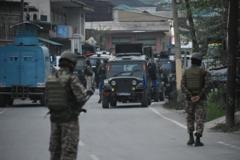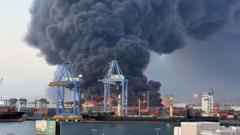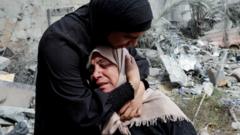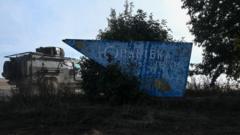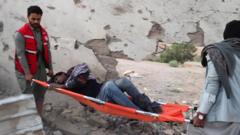Turkish military bases are altering the landscape of Iraqi Kurdistan, particularly in Sergele, where locals face significant challenges as their land and livelihoods are threatened amid ongoing conflicts with the PKK. With civil rights abuses reported and the Iraqi government looking on, residents fight to preserve their way of life.
Life in Iraq’s Forbidden Zone: The Impact of Turkish Military Expansion
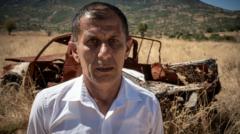
Life in Iraq’s Forbidden Zone: The Impact of Turkish Military Expansion
A glimpse into the lives of villagers in Sergele, Iraqi Kurdistan, as they contend with the encroaching presence of Turkish military bases and the resulting hardships.
Nestled in the scenic mountains of Iraqi Kurdistan lies the village of Sergele, a community historically reliant on nurturing pomegranates, almonds, and peaches. However, this picturesque setting is now threatened as Turkish military installations grow in proximity, reshaping both the geography and life of its residents. Located just 16 kilometers from the Turkish border, Sergele has witnessed an alarming escalation in military presence, which locals fear encroaches upon their ancestral land.
Sherwan Sergeli, a farmer from Sergele, decries the situation, stating, "This is 100% a form of occupation of Kurdish [Iraqi Kurdistan] lands. The Turks ruined it." In recent years, at least seven military bases have sprung up near the village, extending Turkey's reach deeper into Iraqi territory, with one new installation blocking the village's access to crucial water supplies.
The terrain surrounding Sergele has become part of the "Forbidden Zone," a region significantly affected by Turkey's longstanding conflict with the PKK, a militant group seeking autonomy for Kurds in Turkey. This zone spans a wide area along the border, instilling fear among locals as Turkish airstrikes and drone activity have reportedly resulted in civilian casualties. Human rights organizations alert that this expansion has forced numerous residents off their property, with entire villages abandoned in the wake of violence.
Research indicates that Turkish military infrastructure across northern Iraq has expanded substantially since 2018, with over 136 bases established to combat PKK insurgents. This military stronghold now covers over 2,000 square kilometers of Iraqi land, fundamentally transforming local ecosystems and creating a complex web of roads that contribute to deforestation and environmental degradation.
The community’s plight is mirrored in nearby Kani Masi, once known for its thriving apple orchards but now witnessing a drastic reduction in its population due to similar military encumbrances. Salam Saeed, a farmer there, lamented his inability to tend to his vineyard for three years, attributing this to the omnipresent surveillance of drones, and underscoring fears that Turkey aims to annex these territories.
As Turkish forces consolidate their grip on the land, the Iraqi government finds itself in a precarious position. While publicly condemning Turkey's actions, there are indications of tacit cooperation with Turkish officials to combat the PKK. A memorandum signed in 2024 between Ankara and Baghdad confirms ongoing collaborative efforts, though without explicitly addressing the status of Turkish troops on Iraqi soil.
Despite internal pressures, the Kurdistan Regional Government (KRG) maintains a pragmatic relationship with Turkey, focusing on mutual interests related to security and economic prosperity. Officials, such as Hoshyar Zebari of the KDP, downplay negative impacts on civilians, stating the Turkish military's primary focus remains on the PKK.
Nevertheless, the violence continues unabated. Recently, incidents of civilian casualties have surged, exemplified by the tragic death of 24-year-old Alan Ismail, who, while on a family outing, fell victim to an airstrike attributed to a Turkish drone. His father’s despair reflects a heartbreaking reality for many: “They have no rights to kill people in their own country on their own land."
As families seek accountability for civilian lives lost, a troubling pattern emerges, where local courts often obscure the facts surrounding these violent incidents, complicating the paths to justice and compensation for victims. Amid all of this, the KRG has superficially acknowledged civilian losses while distancing itself from direct responsibility for the actions of Turkish military forces.
In the face of these overwhelming challenges, residents like Alan's father express a simple desire for recognition of their pain amidst the ongoing conflict, a closure that remains frustratingly elusive as the situation continues to develop.









